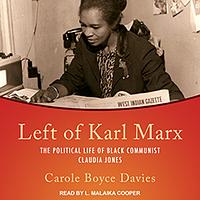Take a photo of a barcode or cover
29 reviews for:
Left of Karl Marx: The Political Life of Black Communist Claudia Jones
Carole Boyce Davies
29 reviews for:
Left of Karl Marx: The Political Life of Black Communist Claudia Jones
Carole Boyce Davies
Fascinating subject matter held back by both academic language and formatting. Which I don't blame the author for, she's writing for her audience, but it definitely effects the quality of the book.
Really cool that Claudia Jones was figuring out intersectionality almost 50 years before Krenshaw would coin the term.
Really cool that Claudia Jones was figuring out intersectionality almost 50 years before Krenshaw would coin the term.
challenging
informative
inspiring
reflective
medium-paced
challenging
informative
medium-paced
To preface: Left of Karl Marx was edifying and I think Boyce Davies did achieve the goals she set out in the introduction of the book. I definitely left with a stronger understanding of Jones’ (previously minimized/erased) place in the constellation of activists in 20th century America—especially in regard to feminism, Black liberation, and anti-imperialism, and decolonization. (Some of the angles on Jones’ Communism are lacking, but there’s a repeated implication in Left of Karl Marx that Boyce Davies’ writing might be in conversation of sorts with John H. McClendon III’s work on Jones, which I haven’t read yet!) As someone who has read/written a lot about identity construction and immigration, I found Boyce Davies’ segments about Jones and transnationalism particularly interesting.
It’s unfortunate that the book is so poorly edited. There’s a lot of unmotivated repetition, tautologies, notes that don’t quite line up with the text (or are also repetitive), and asides by the author about Jones’ appearance and assumptions about Jones’ thoughts and feelings that felt out of place. That said, I look forward to reading Boyce Davies’ collection of Jones’ writing. It’s apparent regardless of my criticisms that Boyce Davies did a remarkable mass of invaluable research for this project!
It’s unfortunate that the book is so poorly edited. There’s a lot of unmotivated repetition, tautologies, notes that don’t quite line up with the text (or are also repetitive), and asides by the author about Jones’ appearance and assumptions about Jones’ thoughts and feelings that felt out of place. That said, I look forward to reading Boyce Davies’ collection of Jones’ writing. It’s apparent regardless of my criticisms that Boyce Davies did a remarkable mass of invaluable research for this project!
I thought this would be more of a biography, but it is not :(
challenging
emotional
informative
inspiring
reflective
tense
medium-paced
informative
reflective
slow-paced
challenging
hopeful
informative
reflective
medium-paced
This book is incredible in so many ways. First, it shines a light on Claudia Jones brilliance and contributions to leftist political theory and social justice activism, which the United States tried to bury from history. Second, it’s so well organized and quite beautifully written. Third, it showcases jones’ humanity in several ways - like how she expressed herself through poetry, how she made deep personal connections in the movement and in the various communities she was part of, and how she eloquently and brilliantly exposed the US government’s hypocrisy and unlawfulness while defending herself from unjust political charges that ultimately led to her exile/deportation.
informative
slow-paced
incredible book and an amazing and impactful assessment of Claudia Jones political and cultural legacy. I really appreciated that it was not a biography but a treatment what she worked for and achieved. amazing and very moving and informative and leaves me excited to dive deeper into her and her comrades' work.
i found the articulations of jones' transnational feminism and reclamation of a sort of "migrating subject" identity excellent (ie the davies' discussion and analysis of jones' position in the diaspora/pan africanism/deportation). writing was a little strange, lots of assertions of "[jones] /would have/ thought xyz thing about the future etc" and i wasn't tooo fond of the overreliance on tautological statements vs actual analysis of jones' writing. i will be reading her speeches and articles directly, particularly "International Women’s Day and the struggle for peace”
I read some iffy reviews before deciding to dive into this one but decided to give it a shot anyways. In the end, my thoughts on the book are pretty similar to many of those reviews. This book doesn't exactly work as a straight biography, doesn't exactly work as a "political biography" (in the spirit of something like Black Bolshevik by Haywood or Du Bois' multiple biographies), and doesn't exactly work as an explanation of Claudia's worldview or ideology.
I am no stranger to academic literature and to academic analysis of historical communist thinkers, but personally found this book to be pretty lacking in terms of applicability to my own self-education and strengthening of my own ideology, and think it works more as a purely academic analysis of Claudia than as any sort of educational material for people seeking political understanding.
If you are going to read this I'd highly recommend having at least some knowledge of black feminist history and black feminist critiques of the white American feminist movement prior to the 1980s, and at least a basic knowledge of Marxism-Leninism. I went in with both and decided to jump ship about a third of the way through, but you may be able to get something out of it. I also attempted to listen to this at audiobook while at work and think you might get a bit more out of it with a print copy and lots of skimming.
I may return to it one day, but have decided to shelve it for now in favor of more pressing readings. Davies apparently has a collection of Claudia's writings that I will be purchasing instead and that will probably give me more of what I'm looking for.
I am no stranger to academic literature and to academic analysis of historical communist thinkers, but personally found this book to be pretty lacking in terms of applicability to my own self-education and strengthening of my own ideology, and think it works more as a purely academic analysis of Claudia than as any sort of educational material for people seeking political understanding.
If you are going to read this I'd highly recommend having at least some knowledge of black feminist history and black feminist critiques of the white American feminist movement prior to the 1980s, and at least a basic knowledge of Marxism-Leninism. I went in with both and decided to jump ship about a third of the way through, but you may be able to get something out of it. I also attempted to listen to this at audiobook while at work and think you might get a bit more out of it with a print copy and lots of skimming.
I may return to it one day, but have decided to shelve it for now in favor of more pressing readings. Davies apparently has a collection of Claudia's writings that I will be purchasing instead and that will probably give me more of what I'm looking for.






